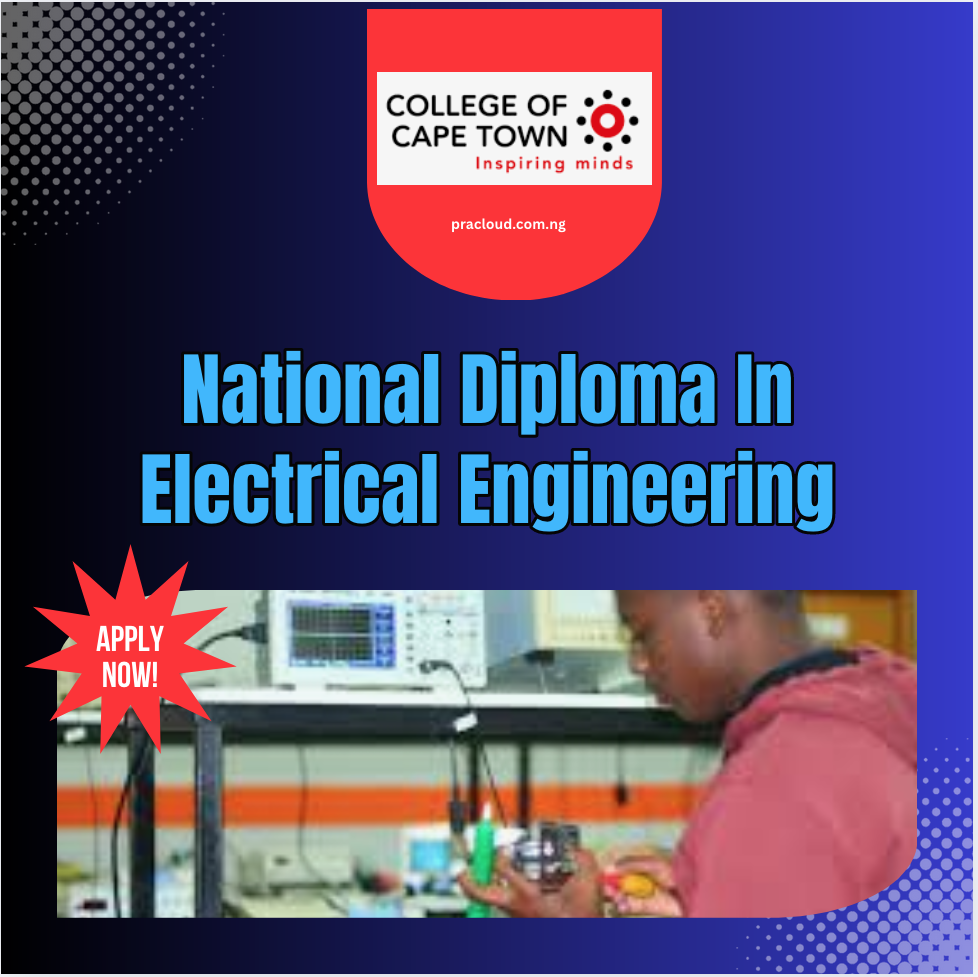National Diploma In Electrical Engineering
National Diploma In Electrical Engineering
National Diploma In Electrical Engineering
How to Apply for a National Diploma in Electrical Engineering:
The National Diploma in Electrical Engineering is one of the most in-demand qualifications for students who want to build a career in the engineering and technology industry. This diploma is designed to give learners both theoretical knowledge and practical skills in areas such as electrical circuits, power systems, electronics, and industrial applications. In South Africa, the qualification is offered at TVET Colleges and Universities of Technology, making it accessible to students who have completed matric with strong results in Mathematics and Physical Science or those with relevant N-level certificates.
The program usually takes three years to complete, combining 18 months of classroom-based learning with 18 months of work-integrated learning or internship. This approach ensures that graduates not only understand the principles of electrical engineering but can also apply them in real workplace situations. Subjects often covered in the diploma include electrical principles, power machines, digital and analogue electronics, mathematics, and engineering design.
Earning a National Diploma in Electrical Engineering opens up a wide range of career opportunities. Graduates can work as engineering technicians, maintenance specialists, or installation experts in industries such as energy, manufacturing, telecommunications, and construction. Others may choose to pursue entrepreneurship by starting their own electrical services businesses.
In addition, completing the diploma allows students to further their studies by enrolling in an Advanced Diploma or Bachelor of Technology (BTech) in Electrical Engineering, paving the way toward professional registration and higher-level engineering roles. For anyone passionate about innovation, problem-solving, and technology, the National Diploma in Electrical Engineering is a solid foundation for a rewarding career.
What Is a National Diploma in Electrical Engineering?
- A National Diploma in Electrical Engineering is a formal qualification offered mainly at TVET Colleges and Universities of Technology in South Africa and other countries that follow similar education systems.
- It is designed to provide students with theoretical knowledge and practical skills in the field of electrical engineering, preparing them for both employment and further studies.
What Are The Courses And Programmes Covered Under The National Diploma in Electrical Engineering
The diploma typically includes modules such as:
- Electrical Principles and Circuits
- Power Systems and Machines
- Digital and Analogue Electronics
- Industrial Electronics
- Mathematics and Communication Skills
- Control Systems and Programming
- Engineering Drawing and Design
National Diploma In Electrical Engineering Admission Requirements
Below are the entry requirements for the Diploma in Electrical Engineering courses:
- N1 Entry Requirement: Grade 9 (Std 7) Certificate with a pass in Mathematics and Physical Science, OR no formal qualification for everyone 23 years or older.
- N3 Entry Requirement: Grade 11 (Std 9) Certificate with a pass in Mathematics and Physical Science or N2.
- N4 Entry Requirement: Matric/Grade 12 (with full mathematics and science 40%+ Pass rate), or N3 Pass (with mathematics and science)
NOTE: Proceed to the next level only when the previous level has been completed, i.e., N4 for N5.
Articulation Options
The following programs are highly complementary, and students can articulate with direct access to the following from the N3 level:
- Multi-Disciplinary Draughting National Certificate
- National Certificate: Architectural Technology NQF5
- National Diploma: Structural Steel Detailing NQF5
National Diploma In Electrical Engineering Duration
- Usually takes 3 years full-time.
- The program is divided into:
- 18 months of theory (coursework done at the college/university).
- 18 months of practical training (Work Integrated Learning/internship in industry).
What you get after you complete the National Diploma in Electrical Engineering
- National Certificate: If all exams from other departments are passed, the student will be given a national certificate by the Department of Education.
- Not them, but only the Department of Education, issuing this certificate.
National Diploma:
- Work in the Electrical branch of engineering for 24 months (2 years), gaining expertise in at least two of the subjects learned in N6, before applying for a National Diploma at the campus where they previously attended.
National Diploma In Electrical Engineering Career Pathways
Graduates can work as:
- Electrical Engineering Technicians
- Power Plant or Utility Technicians
- Maintenance and Installation Technicians
- Engineering Assistants in construction, energy, or manufacturing sectors
- Or even start their own businesses in electrical services.
The National Diploma in Electrical Engineering is a valuable qualification for students who want to combine technical knowledge with practical experience in one of the most dynamic fields of study. With its strong focus on problem-solving, innovation, and applied learning, the diploma equips graduates with the skills needed to thrive in industries such as power generation, telecommunications, construction, and manufacturing. Its structure of both theoretical study and workplace training ensures that students graduate ready for real-world challenges.
OTHER RELATED LINKS:






